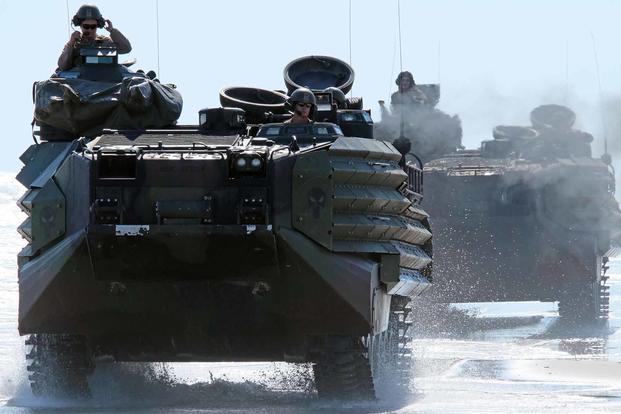Navy Secretary Carlos Del Toro has issued Letters of Censure to five officers who were in positions of leadership during the fatal sinking of an amphibious assault vehicle, or AAV, on July 30, 2020, according to a statement issued Monday. The incident led to the deaths of eight Marines and one sailor.
The move comes almost a year after the last of four investigations found that
"poorly-maintained AAVs, inadequately trained personnel and the failure to conduct a timely egress caused the sinking of the AAV and the tragic loss of life," Adm. Samuel Paparo, U.S. Pacific Fleet commander, noted in a letter endorsing the 2021 report.
The five officers censured include now-retired Lt. Gen. Joseph Osterman, Col. Christopher Bronzi, Capt. Stewart Bateshansky, Capt. John Kurtz, and Lt. Col. Keith Brenize.
Osterman, Bronzi and Brenize were all Marine officers in the chain of command for the unit that provided the AAVs for the exercise. Kurtz was the commanding officer of the USS Somerset -- the ship that launched the craft -- and Bateshanksy led the amphibious task force involved.
Some of the officers have already faced punishment. Bronzi, who commanded the 15th Marine Expeditionary Unit at the time, was relieved of his command in March 2021.
In his 2021 endorsement letter, Paparo said that, "unless otherwise directed," he planned to take administrative action regarding Bateshansky and Kurtz, but a Navy spokesman, citing the Privacy Act, said no further details would be available.
Del Toro, in his statement, said that the letters were issued following a thorough review of the command investigations," adding that the five "officers received [letters of censure] due to their inadequate leadership and execution of their oversight duties."
Osterman, who is now retired but served as commander of I Marine Expeditionary Force at the time of the accident, had not previously been held culpable for the deadly incident, but Del Toro noted in his letter of censure that the general was "responsible for mitigating the inherent risks in operations and training" and that he "did not fully appreciate the potential negative impact of COVID-related challenges" on the 15th Marine Expeditionary Unit.
According to a LinkedIn profile that appears to belong to Osterman, he is now an executive consultant on leadership, strategy and national security.
The letters, which are placed in service members' personnel files and can often prevent them from being promoted or progressing in their careers, come just days after Del Toro released a Navy-wide message on leadership and accountability in early June.
"When leaders' actions or inactions result in the loss of life or capital resources or simply lower our standards, the senior leadership of the [Navy] has a responsibility to determine the root cause and hold responsible persons appropriately accountable," Del Toro wrote in the message. "I would encourage all leaders -- especially those in command -- to continually assess your team's performance ... and always ask for help when needed."
A Marine Corps report into the AAV sinking noted that "ultimately, this tragic mishap was preventable." The AAV that sank was built 17 years before the youngest Marine killed was born and suffered from faulty seals on a grill at the front of the vehicle and an incorrectly installed headlight.
Reports also noted that the tragedy was compounded by the fact that there were no safety boats in the water and unit leaders failed to ensure their Marines had completed egress training, which teaches them how to get out of a sinking vehicle or aircraft.
As the vehicle began to take on water, another AAV that came up to help accidentally bumped into it, turning it sideways into the choppy waves. With a hatch open, water quickly filled the troop compartment, and the AAV sank with most of its crew still on board.
The Marine Corps has since barred AAVs from operating in the water.
"We must cherish the special trust, confidence, and responsibility that comes with command and should never take it for granted," Del Toro wrote in his message to the fleet. "The lives of our Sailors, Marines, and [Navy] civilians depend on it."
-- Konstantin Toropin can be reached at konstantin.toropin@military.com. Follow him on Twitter @ktoropin.













